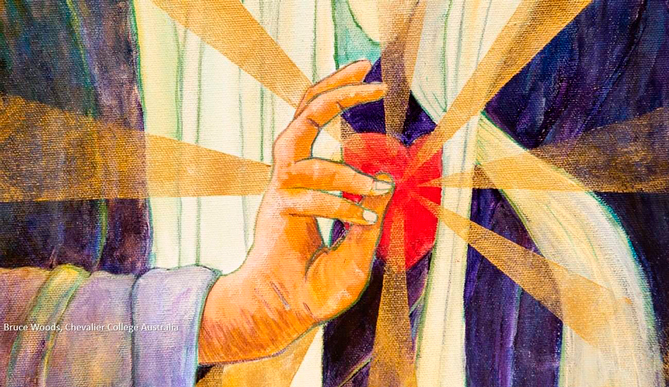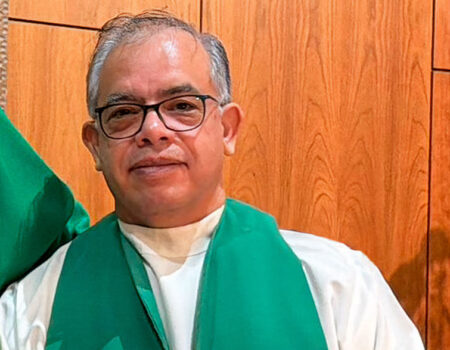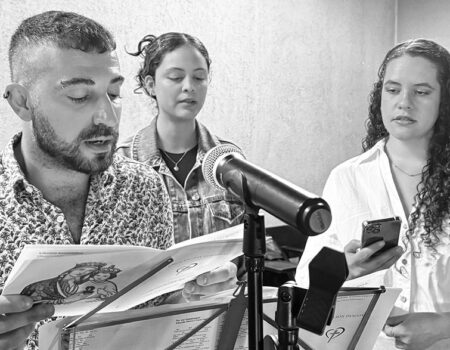“A Spirituality which can change hearts”
Monday July 22, 2024

The Spirituality of the Chevalier Family.
Pope Francis wrote in “Laudato Si”: “The crisis in which the world is currently immersed cannot be resolved by purely technical measures. What is required is “a conversion or change of heart” (n. 218). And in his Apostolic Letter “Evangelii Gaudium,” of 2013 he had already stated: “we need “a Spirituality which can change hearts” (n. 262). That, also, was exactly Fr. Chevalier’s intention. In 1854, he gathered Fathers, Brothers, and later Sisters and Lay people to start “a movement of the heart.” All members of the Chevalier Family were sent to spread the Devotion to the Sacred Heart, now called a Spirituality of the Heart. In 1854, during a conversation with Fr. Maugenest, Fr. Chevalier declared: “Two evils are destroying our unhappy world – indifference and egoism – an effective remedy is needed and such remedy lies in the Sacred Heart of Jesus which is love and charity” (Personal Notes, Fontes MSC p. 107).
Just as he had discovered the true Jesus of the Gospel through the Sacred Heart devotion, he was convinced that when Jesus of the Gospel became better known, people would begin to love and follow Jesus. In this way, they would repent of selfishness towards the poor and indifference towards religion so that society would be healed of these ills, so widespread after the French Revolution of 1789.
Therefore, he urged people to read the gospels. “After all, he wrote, the core of the Gospel is nothing but the compassion, mercy and love of the Sacred Heart of Jesus” (Meditations I, Preface). For many Catholics, however, the Bible was, for the most part, a closed book. That was also one reason for Chevalier to promote the Devotion of the Sacred Heart. For him, the Christian religion could be identified with Devotion to the Sacred Heart (SCJ p. 148; DR = Daily Readings July 8).
Fr. Chevalier’s attempt to bring people back to reading the Gospel message to bring them to a conversion of heart is still relevant today. In fact, in the writings of Pope Francis, we find a similar message. For instance, in ‘Evangelii Gaudium,’ the Pope writes: “Evangelization is first and foremost about preaching the Gospel to those who do not know Jesus Christ or who have always rejected him” (EG 15). Because, “before all else, the Gospel invites us to respond to the God of love who saves us, to see God in others and to go forth from ourselves to seek the good of others” (EG 39). Just like Fr. Chevalier, the Pope also underlines the fact that today’s society “promotes forms of collective egoism” (LS 204); and that in today’s world, “a cool, easy-going, global indifference has developed” (FT = Fratelli Tutti 30). He even speaks of a “globalisation of indifference” (LS 52). Therefore, “we need to experience a conversion or change of heart,” writes the Pope, quoting the Australian bishops (LS 218).
Chevalier’s most important publications are his books “The Sacred Heart of Jesus” (4th ed. 1900) and “Our Lady of the Sacred Heart (4th ed. 1895). Fr. Piperon points out that twenty years of study preceded these publications. That is, among other books, twenty years of studying Holy Scripture, using the works of exegetes and theologians of his time. His understanding of the Sacred Heart Devotion was thus not based on the apparitions of the Sacred Heart to Margaret Mary Alacocque at Paray-le- Monial, – he certainly had great reverence for her – but on his study of the Bible, alongside studies by other authors. In what follows, inspired by Chevalier and relying on the studies by Fr. Bovenmars msc and Fr Dennis Murphy msc, I’ll briefly present some of the main elements of a biblical vision of the Spirituality of the Heart as a spirituality that may change hearts.
The human heart. In the Bible, the word ‘heart’ often refers to a person’s inner life and character. In line with this biblical usage, Chevalier writes: “Our heart that is ourselves… It is thanks to our heart that we are a person. It is our heart that determines the value of our thoughts, actions and intentions. All the good we do comes from the treasury of our hearts” (cf. Luke 6:45 ; SCJ = Sacré Cœur de Jésus p. 105; DR June 25). When the prophet Samuel was instructed to anoint young David as the new king, he heard the Lord say, “People look at the outward appearance, but the Lord looks at the heart” (1 Samuel 16:7). The author of the Proverbs of Solomon then exhorts us, saying, “Above all, guard your heart; it is the source of your life” (Proverbs 4:23).
A new heart. But the Prophets and Psalmists know that evil and sin also spring from the human heart. The prophet Jeremiah complains, “Nothing is so unreliable as the human heart, beyond remedy, who can understand it?”(Jer. 17: 9). Therefore, the Lord intends to establish a New Covenant with his people, making God’s relationship with us trustworthy. Jeremiah testifies, “This is the covenant I will make with Israel in the future – speaks the LORD: I will put my law in their innermost being and write it in their hearts. Then I will be their God and they shall be my people” (Jer. 31: 33). And according to the prophet Ezekiel, the Lord promises: “I will give you a new heart and a new spirit, I will take your stony heart out of your body and give you a living heart in its place” (Ez. 36: 26). (The MSC Constitutions of 1985 quote this text on p. XIV.)
Jesus follows the way of the heart. In Jesus, this New Covenant becomes a reality. Chevalier affirms: “His heart was affected by the suffering of the people” (SCJ p. 129). For Chevalier, “the Heart of Jesus is the whole Jesus. It is the Heart of God, centre and source of all acts, that make up the life of Jesus” (SCJ. p. 131-133; DR June 29). Jesus endorses the New Covenant through the gift of himself at the Last Supper as a foreshadowing of the gift of himself on the cross. Chevalier sees this reflected in the Eucharist: “the masterpiece in which the love of the Heart of Jesus has gone to extremes for us. It flows from his Heart like a river from its source.”
As a result, we, too, are enriched with a new heart as the source of a renewed relationship with God our Father, our fellow human beings, and God’s creation. A new Spirit animates us, the Spirit that removes the ills of selfishness and indifference and replaces them with the gifts of the Spirit, which Paul mentions, “love, joy and peace, patience, kindness and goodness, faith, gentleness and self-control” (Gal 5: 22-23).
Chevalier sees the pierced heart, from which blood and water flow, as announcing the birth of a new heaven and a new earth: “From the Heart of the Incarnate Word, pierced on Calvary, I see a new world emerging” (SCJ p. 145). Our 1985 MSC Constitutions (p. 1; n. 9) quote this text and state: “When we look up to Him who was pierced, we see the new heart, which God has given us, an inexhaustible source of life” (cf. John 19:37).
For Fr. Chevalier, the Heart of Jesus was a revelation of God’s love and mercy and God’s power and strength. He writes: “Two qualities seem to dominate in God: mercy and power. The Heart of Jesus possesses these two virtues to an eminent degree. They are the distinctive characteristics of his mission. From the cradle to the cross, mercy and strength show themselves in Him in an incomparably striking way.” Like him, we “must be marked by this twofold character” (SCJ p. 200).
The Heart of Creation. Moreover, Fr. Chevalier affirms that Jesus Christ does not begin to exist in the Manger of Bethlehem nor end on Calvary. “He fills all ages with his presence. He shows himself to all generations. He hovers over the universe. He shines like a mild sun, on all races, tribes and peoples” (SCJ p. 4). Thus, Fr. Chevalier elaborates on the role of the Heart of Jesus in the creation of the universe and humanity. He is inspired by texts that speak of God’s wisdom and creative Word, finding their origin in God’s Heart and revealing themselves in the Heart of Jesus Christ. Jesus Christ “reunites the whole of creation: I am the Life, he tells us, all created life and uncreated life, plant, animal or material life, spiritual or rational life. … His heart is the organ for the thanksgiving of the universe” (SCJ p. 74-76). And he exclaims: “The Heart! See the central point where everything converges” (SCJ p. 62ff). So, Chevalier attests, “in everything the Sacred Heart is the last word. Everything leads back to Jesus… and in Jesus, everything leads back to his Heart” (SCJ p. 76).
About the creation of the human heart, Fr. Chevalier writes: “When God assigned to the human heart, the eminent place it would have in the make-up of human beings, he was thinking … of the important role that the Heart of the Word Incarnate would have to fulfil in the work of redemption” (SCJ p. 139). How does God accomplish the creation of the human heart? “By creating needs in us in harmony with his desires, God reveals to us the aspirations of his Heart through the aspirations of our own heart… Our heart is made for his Heart “ (SCJ p. 77).
Fr. Chevalier concludes his study with words that may also summarise the broad perspective included in a Spirituality of the Heart and the role that Our Lady of the Sacred Heart plays in our spirituality. Chevalier writes: “What magnificent insights this study has helped us discover! We have seen the mysterious chain which binds the human heart to the Heart of Christ and the Heart of Christ to the very Heart of God. And the sacred ring which serves as a link is Mary, who has formed from her own blood, by the power of the Holy Spirit, the Sacred Heart of Jesus” (SCJ p. 182).
So, the Spirituality of the Heart, which we, as the Chevalier Family, try to live and promulgate, may indeed be called a spirituality that can change hearts.
Hans Kwakman, MSC





